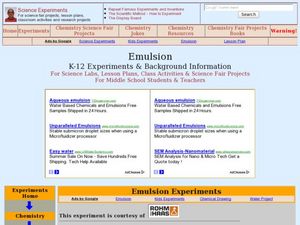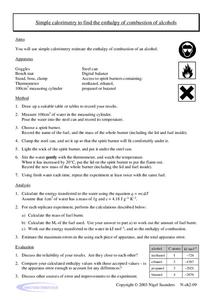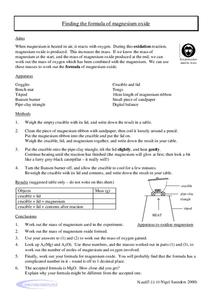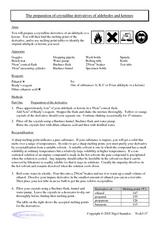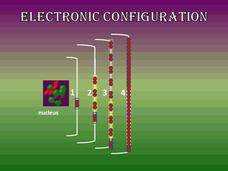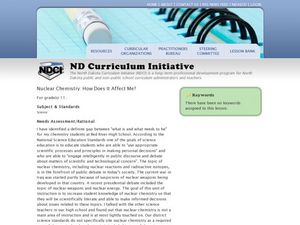Curated OER
Carbon Dioxide
Students conduct a series of experiments to explore carbon dioxide properties. In this chemistry lesson plan, students explain the production and uses of this gas. They measure its amount in soda and waste product of yeast.
Curated OER
Chemiluminescence
Students explore chemiluminescence through various experiments. In this chemistry instructional activity, students explain the chemical reaction that drives the process. They give real life applications of chemiluminescence.
Curated OER
Rusting-A Form of Oxidation
Young scholars conduct an experiment to observe oxidation. In this chemistry lesson, students explain how rusting happens. They rank metals according to their conductivity.
Curated OER
Emulsions
Students identify the characteristics and composition of emulsions. In this chemistry lesson, students classify household products according to emulsion type. They explain how to make the best emulsion.
Curated OER
The Nature of Chemical Change: Acting Out an Example
Students identify the signs that a chemical reaction took place. In this chemistry lesson, students role play the movement of different molecules of matter. They classify matter according to their properties.
Curated OER
Chemistry Worksheet 14
In this chemistry worksheet, students sketch several diagrams of different peptide chains. Students sketch diagrams of galactose and fructose.
Earth Day Network
Staying Green While Being Clean
Clean up the environment with a lesson plan that focuses on replacing hazardous cleaning supplies with green, environmentally-friendly products. Using a dirty patch of surface as a control area, kids clean other parts of various surfaces...
Curated OER
Displacement Reactions of Metals
Chemistry stars experiment with metals to observe reactivity with salt solutions. They test magnesium, zinc, iron, and copper by immersing them into different solutions and observing for changes. A separate set of data tables is...
Curated OER
Reactivities of the Group 7 Elements (The Halogens)
During this lab activity, chemists discover the reactivities of chlorine, bromine, and iodine as examples of the halogens. They use a displacement reaction as a test by adding other compounds and observing for a color change. The lab...
Curated OER
Simple Calorimetry to Find the Enthalpy of Combustion of Alcohols
Accomplished chemistry learners set up a calorimeter and measure the energy released by various alcohols: methanol, ethanol, and either propanol or butanol. Lab masters will first need to design their own tables for recording data....
Curated OER
Finding the Formula of Magnesium Oxide
Rather than simply matching up the ionic charges on paper, this exercise gets chemists into the lab to determine the chemical formula for magnesium oxide! If a know amount of magnesium is used, an oxidation reaction results in this...
Curated OER
The Effect of Dissolved Salt on the Boiling Point of Water
Explore the properties of solutions with a lab activity. Chemistry fans determine the boiling point of water, add salt to create a solution, and then repeat the process four more times. They design their own data table and then graph the...
Curated OER
A Solubility Curve for Potassium Nitrate
Step-by-step laboratory instructions are listed so that chemistry explorers can consider the solubility of potassium nitrate. They combine their results with those of other lab groups and then graph the data to display the solubility...
Curated OER
Comparing the Degree of Unsaturation of Margarine with that of Butter
Is butter better? In terms of saturation, young chemists find out! Using titration methods, they will compare the degree of unsaturation of butter with that of margarine. Knowing the unsaturation, they can make conclusions about the...
Curated OER
Find the Percent of Iron in Manganate (VII)
Dilute sulphuric acid is used to oxidize manganate (VII) into manganese (II) and water. Step-by-step procedures are outlined on the worksheet as well as calculations for junior chemists to perform in their science journals. This...
Curated OER
Properties of Ionic and Covalent Compounds
Test six various reagents for their ability to conduct electricity. Cooperating chemists research whether each is ionic or covalent and discover the relationship between bonding and conductivity. This laboratory exercise would be an...
Curated OER
pH Curves and Indicators
Glimpse how pH changes during an acid-base titration by examining graphs. It contains not only graphs of pH changes, but also a chart summarizing what indicator to choose for different changes. This is not truly a worksheet, but an...
Curated OER
Preparation of Crystalline Derivatives of Aldehydes and Ketones
Chemistry explorers prepare a crystalline derivative and find its melting point. Once they discover the melting point, they are able to identify whether or not the substance is pure, and whether it is an aldehyde or ketone. This is an...
Curated OER
Nomenclature Worksheet
As the title suggest, this is an exercise in chemical nomenclature. By completing it, young chemists will practice writing formulas for compounds named, and they will practice naming compounds that are listed by empirical formulas. These...
Curated OER
Electronic Configuration
The creator of this collection of chemistry slides is clever! Electron configuration is explained as, click-by-click, orbitals are displayed and then each is subsequently filled with the proper amount of electrons. After the progression,...
Curated OER
Functional Groups ~ What is the Family Name?
These 37 slides start with definitions of six types of functional groups, their molecular structure, and multiple examples or each. During the rest of the presentation, organic chemistry learners are given an opportunity to practice...
Curated OER
Nuclear Chemistry: How Does It Affect Me?
Eleventh graders study the different areas of nuclear chemistry. In this energy and critical thinking instructional activity students study radiation, nuclear energy and weapons then divide into groups and create a poster.
Curated OER
Nuclear Chemistry
In this nuclear chemistry worksheet, students solve nine decay problems. They determine what forms in each problem given the radioactive element.
Curated OER
Chemistry of Iron and Charcoal Manufacturing in PA
Students examine the historical purpose of the forests in Pennsylvania and investigate how the iron manufacturing process works. In this chemistry lesson students write the chemical formula for making charcoal.
Other popular searches
- Organic Chemistry
- Chemistry Chemical Reactions
- Chemistry Periodic Table
- Chemistry Equations
- Chemistry of Life
- History of Chemistry
- Chemistry Lesson Plans
- Organic Chemistry Projects
- Food Chemistry
- Chemistry Current Events
- Chemistry of Soap
- Water Chemistry





